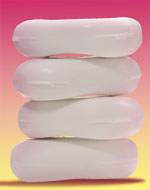
Why use an antibacterial soap instead of regular soap?
Soaps and other products claiming antibacterial properties have
become increasingly popular in the past decade as consumers
have turned to them as a defence against household germs.
If you believe the advertising and packaging claims, antibacterial soaps "fight harmful germs", "eliminate almost all bacteria" or "help protect against germs" – germs and bacteria being words that strike fear in most consumers' hearts.
Is there a difference between an antibacterial soap and
a hygiene soap?
Yes and no. Both contain antibacterial agents
such as triclosan (the most commonly used one) or chloroxylenol.
But a soap that claims to be antibacterial has to be registered as a medicine, a complicated process, which is why most brands opt for the descriptive "hygiene", "hygienic" or "health" instead, which qualifies the soaps as cosmetics. They claim to "fight" or "help to fight" germs rather than "kill" them.
How much more expensive are these soaps than the
regular ones?
Take the soap bar example:
A 125g bar of regular
soap such as Lux or Vaseline costs R2,99. A 100g bar of Cuticura
hygiene soap costs R4,99 and a 100g bar of Medisan costs R5,99.
Are they worth the extra money?
No, they're not, says the US Food and Drug Administration (FDA). Its panel of health advisers declared recently it had evidence that these products aren't any more effective than ordinary soap and water, and it has warned manufacturers that they're likely to be called upon to prove their marketing claims.
Is there any harm in using these products, just in case?
The FDA and other health bodies have expressed concern that
the chemicals used in these products could actually be putting
consumers' health at risk by creating drug-resistant "superbugs".
Microbiologist Dr Stuart Levy of Tufts University believes these
products should be confined to use in hospitals and homes with
very sick people who're at greater risk if they get a bacterial infection.
Most common ailments, such as coughs and colds, are caused by viruses, not bacteria. Researchers at Columbia University gave antibacterial cleaning products to 120 New York families, monitored them for nearly a year, and found they experienced about the same number of runny noses, sore throats and fevers as another group that got regular soaps and detergents.
How can antibacterial products create superbugs?
"We
run the risk of changing the kinds of bacteria we confront every
day in the home," says Dr Levy. The small percentage of bacteria
that survive the soap may develop resistance to it, he says. What's
more, some surviving bacteria may have an improved ability to
pump out all threatening substances, including antibiotics used to
cure infections.
Those survivors may pass that mutation to their offspring, and the adaptation can come to dominate an entire population of bacteria, creating a resistance. Dr Levy says this has happened in lab studies, but there is no firm evidence it is happening in households.
What does the industry say?
On the superbug issue, Jill Gardiner of the Cosmetics, Toiletries
and Fragrances Association says: "There is no conclusive scientific
evidence that triclosan is bio-accumulative or that it produces
resistant bacteria, particularly at the low concentrations in which
it's used in cosmetics."
On the cost issue, she says reputable companies seek to make products with "the best ingredients and benefits" to gain market share and "satisfy consumer needs". She concedes that washing with regular soap and water "will reduce the number of germs on the skin significantly". Companies, she says, are driven by market demand.
Photograph: Anton De Beer/Fairlady




 Publications
Publications
 Partners
Partners










